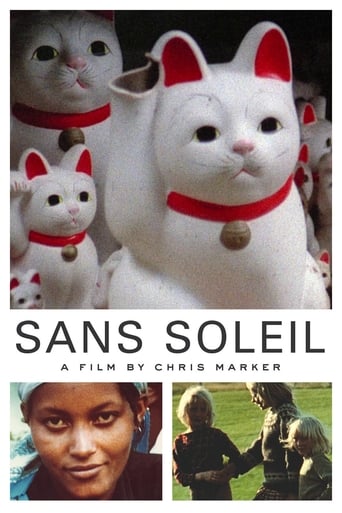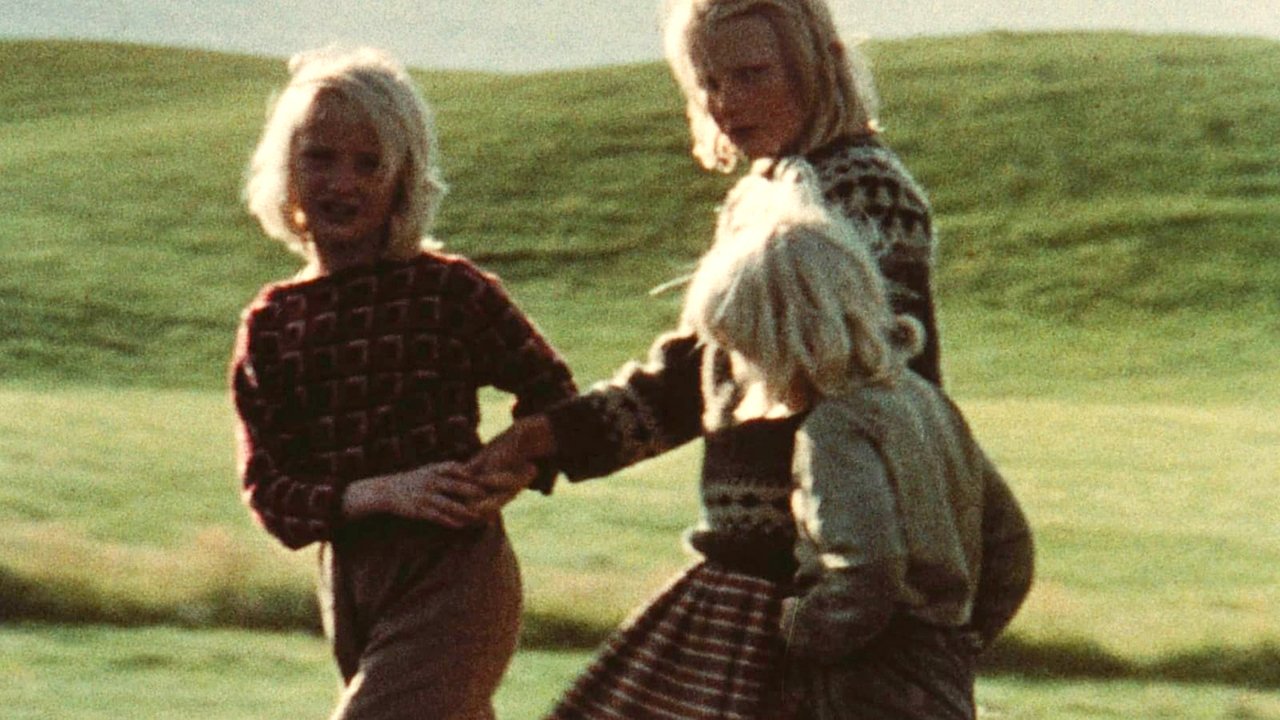Cosmoeticadotcom
Sans Soleil (Sunless)- whose title is adapted from a song cycle by Russian Classical composer Modest Mussorgsky- follows the filmed globetrottings of a fictive man named Sandor Krasna (the stand in for Marker). It is a fictive documentary (but not quite a mockumentary) that flirts with some of the ideas expressed in Godfrey Reggio's unnarrated Quatsi films. Like the earlier film, Sans Soleil has a narrator, but it is not a fictive film, rather a quasi-documentary. The female narrator (Alexandra Stewart) reads letters from Krasna about his voyages from Iceland to Africa to Japan (where the bulk of the film is shot), with short trips to Paris and San Francisco (due to the Vertigo homage). The observations made by Krasna are beautifully reflected in the footage we see (unlike La Jetee, this film has moving color images, not just still black and white photographs). The film opens with an epigraph from T.S. Eliot's The Four Quartets- from Ash Wednesday:Because I know that time is always time And place is always and only place
.Aside from the homage to Vertigo, there is an even more penetrating one to Andrei Tarkovsky's 1979 science fiction film Stalker, wherein Krasna mentions a place where images are transformed, called The Zone. Through all its circumlocutions, the film does find its way back to its start, the images of a trio of Icelandic children, although the length of the film does not enable the viewer to get the same thrilling rush of recognition one does in La Jetee, wherein the panic of the lead character is felt by the viewer in a recapitulation....Sans Soleil ends dependent upon the conceit that so much information about the travels of Krasna has so overwhelmed the viewer, and so lulled him with its rhythmic pacing, that the viewer doubts there can be an end to the film, for Krasna is a character so filled with literal self-conceit it is akin to having an inner seat inside the brain of a man who simply loves the sound of his voice, no matter what nonsense it spews. Thus, when an end does come, it seems abrupt. The interesting thing is that while, stylistically, and innovatively, the later film's ending is far more daring, it simply does not affect the viewer the way the more expected ending of La Jetee does, because there is simply no attempt made to build empathy for Krasna, as there is with the man of the earlier film, nor is there any attempt to make Sans Soleil an emotional work of any kind. From the distancing images of the Icelandic children that open and close the film, to the images from The Zone, this film is detached from reality and emotion. It is also even more explicitly a film about perception, not memory, than La Jetee is.
Butch Corum (butchcorum1950)
At the core of "Sans Soleil," it seems, is the way society chooses to remember things -- and what happens when assumptions are replaced by new facts and a new reality. If this sounds (to use a 1960s expression) "far out," that's because "Sans Soleil" does what few other nonfiction films have done before or since: Link disparate cultures (in this case, Japan, Iceland, Guinea- Bissau and the United States) through street scenes that range from the mundane ("banality," in Marker's on screen words) to the extraordinary.One example: Marker shows sleeping Japanese passengers on a ferry, then a subway framed by Tokyo's skyline, then a bird walking serenely on water, then an African woman smiling, then a cat temple in Japan where families pray for felines. "We do not remember -- we rewrite memory much as history is rewritten," says the film's erudite narrator as she reads a letter supposedly written by Sandor Krasna. In truth, Krasna is actually Marker, who invented the person of Krasna to ... well, it's anyone's guess because Marker doesn't give interviews and prefers to let his work speak for itself. Here's one guess:Marker, who's never seen in "Sans Soleil," doesn't want to take full credit for a film that draws from so many displays of public rituals.Like Edward Steichen's "The Family of Man" photography project, "Sans Soleil" captured lives and moments that were ordinarily overlooked -- though instead of a team of photojournalists, it was just Marker who roamed various continents for the material in this unforgettable movie. Few other filmmakers but Marker would travel to the outskirts of Guinea-Bissau, take pictures of working-class people, then juxtapose the footage with a rolling commentary about the country's revolution that toppled Portuguese rule. That revolution inspired revolutionaries in Europe, but as Marker dryly notes, "Who remembers all that? History throws its empty bottles out the window." In reading Marker's lines, actress Alexandra Stewart ("Exodus," "Day for Night") cites everyone from the Japanese poet Basho to Marlon Brando. (Marker's footage of San Francisco was inspired by Hitchcock's "Vertigo.")
porlawright
This film keeps coming back to me. It utterly confused me at first but something about it made me go back and watch again. It is a film that can fit into many definitions, none of them however, definitively.The problem of capturing reality is a problem central to film theory, most do it by creating the 'reality effect' via the familiar codes of continuity editing etc, but it is just that, an illusion. Marker, like Godard, purposely confounds these codes and explores the limits of film/the image/art in order to examine what Benjamin called 'erfahrung' - a formulation for experience aligned to memory as apposed to immediacy. True experience is the recollection of events, a retracing of the path of memory. Only when experience is assimilated in this way can meaning be derived from it.Sans Soleil plays with the idea of grand historicising themes, focusing on the narratives left untold in the history books, the story of the defeated, strange cultural idiosyncrasies, the easy, lazy way emotions are manipulated by the camera, so a man's tears of gratitude are revealed by context to be tears of rage. Marker takes canonical historical signposts and challenges their ability to tell us anything of worth about the world and humanity within it. He jolts (and it is a jolt) our attention away from the official processes of historification, that goes on beneath our noses in cinema, towards the banal and the everyday detail that comes the stuff of life itself.On first viewing, especially if you are unfamiliar with the codes of progressive, experimental or 'counter' cinema, you may well be confused. But you will also be intrigued and on second viewing its secrets begin to reveal themselves. This is released with Marker's short la Jetee, another treat.This is a truly remarkable film, the only piece of cinema that has, for me, chimed on a similar level of complexity and profundity with the works of Shakespeare and one that similarly continues to resonate.
joeloh
A poetic and rambling essay film, in the form of a letter from a lost and lonely traveller. Chris Marker lets his mind and camera roam through the landscape of early eighties Japan, and his imagination drift across the world. Memory history and emotion blend into a loving study of human existence. The film's form is loose and sprawling and it it almost impossible to try to follow it in any linear fashion. Instead it washes across the surface of you conscious mind, occasionally burrowing deep with images you can never forget. It is a completely unique film and is inspiring in its ability to bring the political, the philosophical and the poetic together on screen. Chris Marker is one of the unsung greats of film history.


 AD
AD





